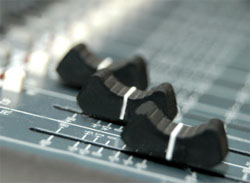When I was coming up as an engineer one of my mentors said something that I carry to every session: “There are two parallel universes in recorded music – greatness and perfection. At times they can touch, but they never intersect. And if you have to pick one, pick greatness”.
This was an absolutely life changing moment, and these are words I’ve tried to live by ever since.
There are times when a wrong note is very much the right note. There are times when a small timing error makes a song come to life.
There are cases when an instrument or vocal being slightly out of tune makes the whole presentation seem so real, and well… great!
And then there are other times when these flaws are indeed flaws (in fact, it’s the majority of times), but still, there are those “magic moments” that pop up from time to time that are “wrong” but in the grand scheme of things they’re unrepeatable and exceptionally right.
I was hanging at a local brew pub with my girlfriend a few weeks ago and this topic came up. She loves music, but blissfully knows nothing about the process employed for the creation of recorded music product.
In an attempt to illustrate my point I referenced a project with which I’m involved that had one of these magic moments occur.
To the protest of the guitar player who came in a half step off but recovered in an amazing manner, his “clam” is not only still on the recording, but prominently featured in the final mix.
My girlfriend never knew it’s a clam, and frankly, if you weren’t in the room when it was being recorded, you’d never know it’s a clam either. But to the guitar player, it was a clam, and that clam needed to be fixed.
Her point: how could it be wrong when it sounds so right? My point to the guitar player: it wasn’t wrong because it absolutely drove home the point and intention of the song.
Technically it was a clam because the guitar player had never intended to play the note, and he broke my cookies about wanting to fix it for a couple of days until the tracking session concluded.
It wasn’t until then, when the sound was broken down, that I won the battle. The clam stayed. It made the song, and most importantly, the artist (who is not the guitar player) loved it as much as I did.
Another example: a couple of years ago, I was working on a project in Nashville with a friend, and after the session one night he broke out two copies of Pink Floyd’s “Dark Side of the Moon”.
One copy was the 5.1 mix, the other the original Alan Parsons “quad” mix, and my friend both on his hard disk recorder and could toggle between the two presentations with the press of a single button.















